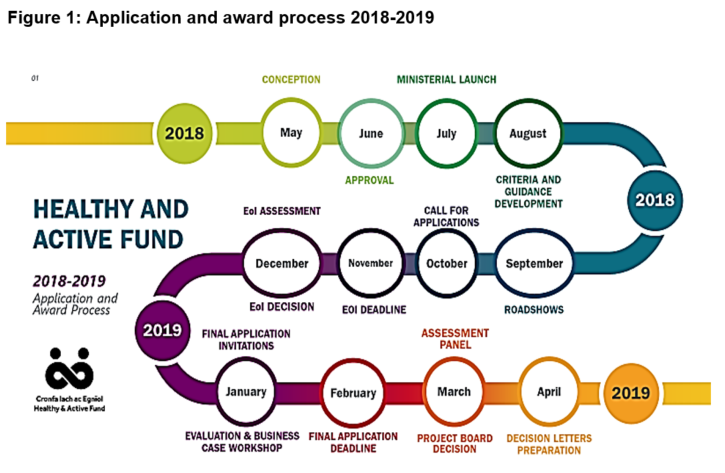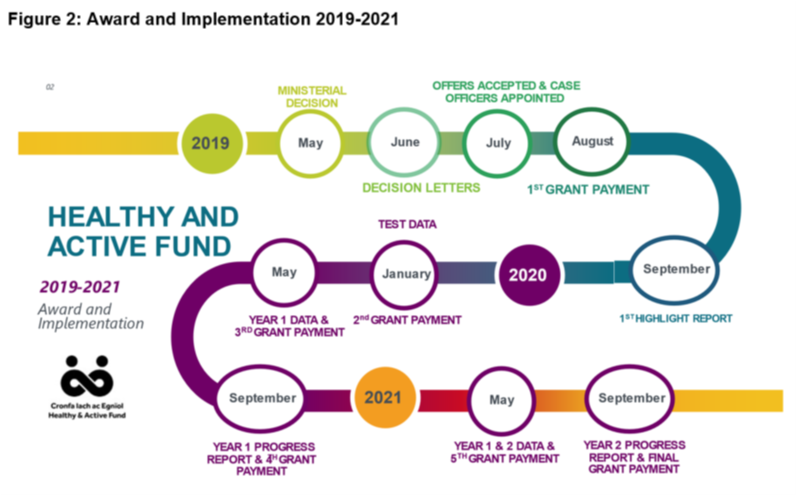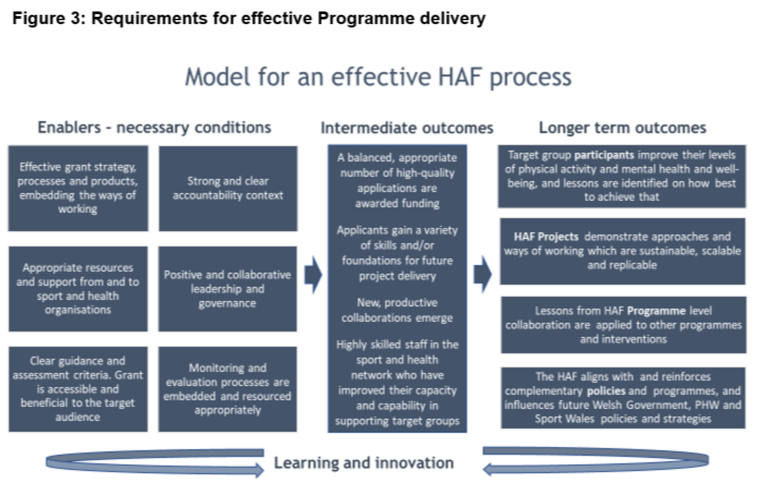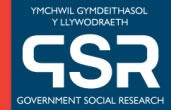The Healthy and Active Fund: a process evaluation (summary)
A report assessing the design and delivery of the Healthy and Active Fund. It covers the period from the Fund’s inception through to the first quarter of project delivery.
This file may not be fully accessible.
In this page
Programme purpose and partners
The Healthy and Active Fund (HAF) is a £5m+ investment in 17 Projects that enable voluntary sector organisations and public bodies to explore how to support those with inactive lifestyles to become more active. It was designed and delivered through a four-way partnership between two Welsh Government policy teams (Health Inequalities and Healthy Communities in Health and Social Services, and Sports Policy Branch in the Culture and Sport Division), Public Health Wales and Sport Wales. The HAF focuses on those who face significant barriers to leading physically active lives. It aims to sustainably increase their level of physical activity and improve their levels of mental wellbeing. The activities through which the aims were to be achieved were not prescribed, thus making the HAF accessible for a wide range of organisations.
Application and awards process
The four national partners actively sought to shape and steer the Projects, and the HAF team made successive efforts to assist applicants. The HAF launch in July 2018 was followed by a Call for Applications (October 2018) and an ‘Expression of Interest’ (EoI) stage (see Figure 1). This filter led to 43 Projects being invited to apply for a grant.

The HAF partners shaped the Projects through:
- explicit guidance about the key features of the intended outcomes
- an emphasis on the importance of Project-level partnership
- the use of a ‘filtering’ Expression of Interest stage
- a requirement for Projects to develop a full business case
This process consciously and successfully aimed to:
- bring the new Fund to a wide range of potential applicants
- guide potential applicants to bring forward bids to serve the HAF’s objectives
- filter applications through a preliminary stage of ‘Expression of Interest’
- limit full applications to those best able to meet the application process criteria
- apply a rigorous assessment and selection process to choose successful bids
The HAF generated more than 100 expressions of interest and 43 applicants who were invited to submit a full proposal. The marketing and communication about the HAF were generally welcomed by Projects, as was the guidance and support given to applicants. The assessment criteria were clear and detailed, and the assessment process was thorough. The HAF deliberately tried to allow measured risk taking.
Even organisations experienced in preparing grant applications found the overall demands of the process very challenging, but successful Projects recognised that it had given them the foundations to get underway more effectively. The biggest concern was the time taken to notify decisions. This was not in the HAF team’s control, but it had considerable knock on effects. Unsuccessful applicants did not think that the feedback which they received was commensurate with the considerable time and effort they had invested in the process.

Additionality of HAF funding
The Projects that were selected for funding aligned to the areas sought by the HAF, and achieved a balanced geographical spread across Wales.
HAF funding has enabled Projects to take forward and trial new ways of working and take new opportunities and services to a wider audience, and the process was sufficiently flexible to adapt as learning points emerged.
Monitoring and evaluation
Monitoring and evaluation at both Project and Programme levels was an integral part of the HAF design and built into the implementation and delivery.
The monitoring and evaluation requirements were generally viewed by Projects as challenging. Some Projects have comprehensive evaluation plans in place, and these may well provide valuable additional evidence and learning that can be shared.
HAF and the five ways of working
The five ways of working supported by the Well-being of Future Generations (Wales) Act 2015 have been very actively incorporated into the HAF at both Programme and Project levels. Some feature more prominently than others. Collaboration in particular has been a strong and consistent theme at both Programme and Project levels. The HAF has demonstrated an unusual, if not unique, degree of intra-governmental collaboration in Wales, and especially in relation to the aspect of shared budgets.
Sustainability
Many of the Projects referenced ‘seeking other funding sources’ in order to be sustainable. But there are other ‘types’ of sustainability, such as resulting behaviour changes among Project beneficiaries, and whether activities can be mainstreamed.
Effective programme delivery
The HAF has all of the six enablers for effective Programme delivery shown in Figure 3, securing the key intermediate outcomes and laying the ground to deliver on the ambitious outcomes that it has been designed to support.

Areas for further improvement
These include:
- better use of smart reporting in the application forms, especially at EoI stage
- planning timeframes for the whole process, taking account of time requirements for signing off decisions at senior level across different organisations
- joint budget allocations debated and confirmed at the outset
- appropriate resourcing for the staff designing and administering a new grant
- considering how to continue to embed the five ways of working in years 2 to 3
- ensuring the connection between the Programme and the Project level evaluations
- sharing the positive lessons to inform future Programme design
We recommend the following topics for thematic inquiry in the next phase of the overall HAF Programme evaluation.
- What have been and will be the implications for the HAF of the coronavirus pandemic?
- How has (and will) participation in the HAF affected the approach of participating organisations, both at Programme and at Project partner levels?
- How important is ‘agency’ and community involvement in enabling Projects to engage successfully with their target groups, and what role does it play in this regard? Can action at Programme level help with this?
- What are the various meanings of ‘sustainability’ and scalability for HAF funded Projects? What can action at Programme level do to improve Project sustainability?
- How can the HAF Programme help to ensure that the Programme and the Project levels of evaluation are complementary and mutually reinforcing?
Contact details
Report Authors: UK Research and Consultancy Services Ltd
Full Research Report: RCS, (March 2021). Making Change Happen. The Healthy and Active Fund: A Process Evaluation.Cardiff: Welsh Government, GSR report number 22/2021.
Views expressed in this report are those of the researchers and not necessarily those of the Welsh Government.
For further information please contact:
Eleri Jones
Health and Social Services Research
Knowledge and Analytical Services
Welsh Government
Cathays Park
Cardiff
CF10 3NQ
Email: research.healthandsocialservices@gov.wales

Digital ISBN 978-1-80195-122-7
